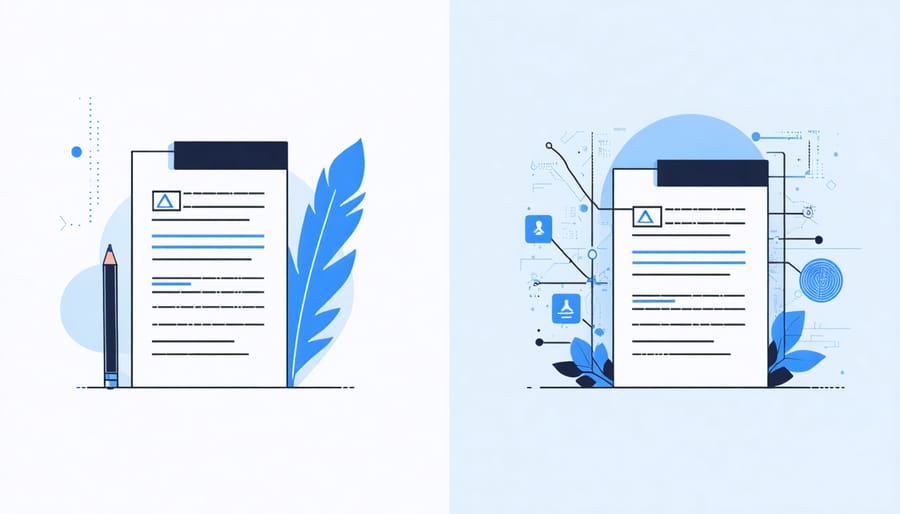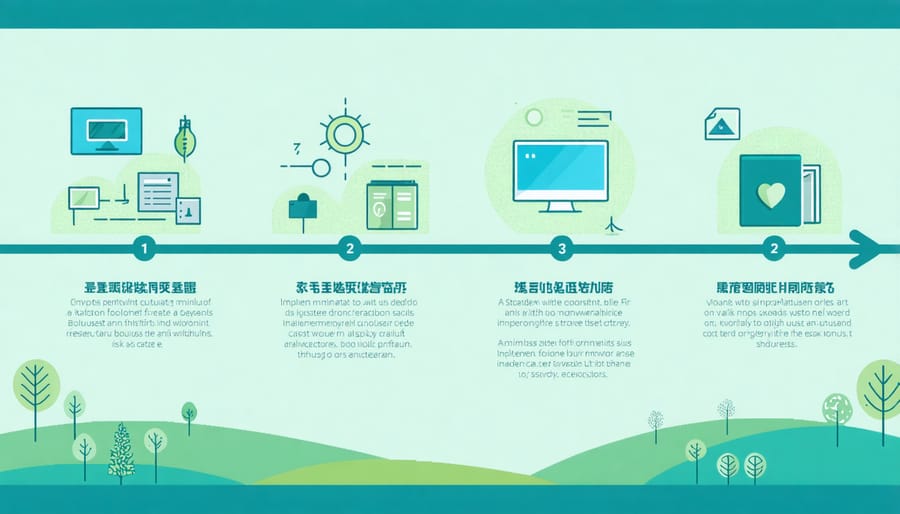GSA contract management demands precise oversight and strategic implementation to maximize federal procurement opportunities in construction. Smart contracts in construction have transformed traditional GSA procurement processes, enabling automated compliance tracking and real-time performance monitoring across complex federal projects. Construction executives managing GSA contracts now leverage integrated digital systems to streamline everything from bid submissions to project closeout documentation, reducing administrative overhead by up to 40% while ensuring Federal Acquisition Regulation (FAR) compliance. As federal construction spending reaches historic levels, effective GSA contract management has become essential for firms seeking to secure and successfully execute government projects, with proper implementation directly impacting project profitability and long-term agency relationships. This comprehensive guide examines cutting-edge GSA contract management strategies, digital tools, and best practices that leading construction firms use to optimize their federal procurement operations and maintain competitive advantages in the public sector marketplace.
The Evolution of GSA Contract Management in Construction

Traditional GSA Contract Challenges
Managing GSA contracts traditionally presents several significant challenges for construction industry professionals. Compliance with complex federal regulations often creates substantial administrative burdens, requiring dedicated staff hours for documentation and reporting. Contract modifications frequently face lengthy approval processes, causing project delays and increased costs.
Another persistent challenge is maintaining accurate pricing and catalog information across multiple contract line items. Construction companies often struggle with the mandatory reporting requirements, particularly the challenging Industrial Funding Fee (IFF) calculations and submissions.
The traditional paper-based system makes tracking contract performance metrics and deadlines particularly cumbersome. Construction firms frequently encounter difficulties in managing option periods, coordinating with multiple stakeholders, and ensuring timely renewals. These manual processes increase the risk of errors and compliance violations.
Furthermore, the conventional approach to GSA contract management often leads to communication gaps between contractors, government representatives, and project stakeholders. This can result in misunderstandings about scope changes, delivery schedules, and contract requirements, potentially leading to disputes and project setbacks.
The complexity of these challenges has prompted many construction industry leaders to seek more efficient, technology-driven solutions for GSA contract management.
Digital Transformation Imperatives
The construction industry faces mounting pressure to modernize its contract management processes, particularly in GSA projects where complexity and compliance requirements continue to increase. Several key factors are driving the urgent need for digital procurement solutions and smart contract systems. First, the sheer volume of documentation and administrative tasks associated with GSA contracts demands more efficient handling than traditional paper-based methods can provide. Second, stakeholders increasingly expect real-time visibility into contract status, modification tracking, and compliance documentation. Third, the rising costs of manual processing and error correction are pushing organizations to seek automated alternatives that can reduce overhead while improving accuracy. Additionally, regulatory requirements for transparency and accountability in government contracts necessitate better tracking and reporting capabilities. The COVID-19 pandemic has further accelerated this transformation by highlighting the limitations of paper-based processes and in-person approvals, making digital adoption not just beneficial but essential for business continuity and competitive advantage in the modern construction landscape.
Smart Contract Integration in GSA Procurement

Blockchain-Based Contract Automation
The integration of blockchain technology in construction management has revolutionized GSA contract automation through smart contract implementation. This system creates an immutable digital ledger that automatically executes, verifies, and enforces contractual obligations without manual intervention.
Smart contracts operate on predefined parameters, triggering automatic responses when specific conditions are met. For GSA construction contracts, this means automatic validation of contractor qualifications, real-time compliance monitoring, and instantaneous payment processing upon milestone completion. The system’s distributed nature ensures transparency while maintaining security through cryptographic protocols.
Key technical components include digital signatures, automated compliance checking algorithms, and interconnected document management systems. When a contractor submits documentation or completes a project phase, the blockchain automatically validates the submission against GSA requirements, updating all stakeholders simultaneously.
The benefits are substantial: payment processing time reduces from weeks to minutes, document verification becomes instantaneous, and contract modifications are tracked with perfect accuracy. This automation significantly reduces administrative overhead and virtually eliminates payment disputes. Construction firms report up to 70% reduction in contract management costs and 85% faster processing times for change orders.
For implementation, firms must integrate blockchain nodes with existing project management systems and establish digital wallet capabilities for secure transactions. While initial setup requires technical expertise, the long-term efficiency gains justify the investment.
Compliance and Verification Protocols
GSA contract management relies heavily on robust compliance and verification protocols to ensure adherence to federal regulations and contract requirements. Smart contract systems play a pivotal role in automating these processes, implementing multi-level verification checkpoints throughout the project lifecycle.
These digital protocols automatically validate contractor credentials, certifications, and security clearances before allowing access to sensitive project information. The system continuously monitors compliance with Davis-Bacon Act wage requirements, Small Business Administration (SBA) size standards, and other federal procurement regulations.
Real-time verification mechanisms track important contract elements including:
– Delivery schedules and milestone achievements
– Quality control documentation
– Safety compliance records
– Environmental impact assessments
– Payment processing and invoicing accuracy
Advanced algorithms cross-reference submitted documentation against established federal guidelines, flagging discrepancies for immediate review. This automated oversight significantly reduces the risk of non-compliance and ensures transparent accountability throughout the contract execution phase.
For construction projects, these protocols integrate with Building Information Modeling (BIM) systems to verify that specifications meet GSA standards and sustainability requirements. The verification process includes automated checks for:
– Material specifications compliance
– Energy efficiency standards
– Accessibility requirements
– Security protocols
– Sustainability metrics
Regular system audits maintain the integrity of these verification processes, while blockchain technology ensures an immutable record of all compliance-related activities. This comprehensive approach to compliance management has demonstrated a 40% reduction in verification-related delays and a 60% decrease in compliance violations across GSA construction projects.
Payment and Progress Tracking
Efficient payment processing and milestone tracking are crucial components of successful GSA contract management. Modern automated payment systems streamline the traditionally complex process of government payments while ensuring compliance with Federal Acquisition Regulations (FAR).
These systems integrate with project management platforms to automatically trigger payments upon completion of predefined milestones. Smart workflows verify deliverables against contract requirements, reducing payment delays and administrative burden. The automation includes built-in compliance checks for Davis-Bacon Act wage requirements and other federal regulations.
Progress tracking functionality provides real-time visibility into project status through customizable dashboards. Project managers can monitor key performance indicators (KPIs), track percentage completion of deliverables, and identify potential delays before they impact the schedule. The system maintains detailed audit trails of all payment transactions and milestone achievements, essential for GSA compliance documentation.
Advanced features include:
– Automated invoice generation and processing
– Digital signature capabilities for payment approvals
– Integration with federal payment systems
– Real-time budget tracking and variance analysis
– Automated compliance documentation
– Milestone notification alerts
Construction firms report significant improvements in payment processing times, with some achieving up to 60% reduction in payment cycles. The enhanced visibility into project progress enables better resource allocation and helps maintain positive cash flow throughout the contract lifecycle.
For optimal results, organizations should configure these systems to align with specific GSA contract requirements and internal workflows while ensuring all team members receive proper training on the platform’s features.
Real-World Implementation Case Studies
Federal Building Modernization Project
A notable example of GSA smart contract implementation is the Federal Building Modernization Project in Denver, Colorado, which demonstrates how digital contract management can streamline large-scale renovation efforts. The $75 million project, completed in 2022, showcased remarkable smart contract implementation results through automated milestone tracking and payment processing.
The project team utilized blockchain-based smart contracts to manage relationships with 23 subcontractors and suppliers, resulting in a 40% reduction in payment processing time and a 60% decrease in contract-related disputes. Key features included automated compliance checking, real-time progress monitoring, and instant verification of completed work phases.
Particularly noteworthy was the system’s handling of change orders, which historically posed significant administrative challenges. The smart contract platform automatically validated change requests against pre-established parameters, reducing approval times from weeks to days. This efficiency contributed to the project’s completion three months ahead of schedule.
The success metrics included:
– 95% reduction in paperwork processing time
– 30% decrease in administrative overhead costs
– Zero payment delays due to documentation issues
– 100% compliance with federal procurement regulations
This case study has become a benchmark for future GSA projects, demonstrating the tangible benefits of digital contract management in complex federal construction initiatives.
Multi-Site Construction Program
Managing multiple construction sites under GSA contracts requires a sophisticated approach to contract administration and coordination. Smart contract implementation has revolutionized how construction programs handle simultaneous projects across different locations. The system allows for real-time monitoring of contract compliance, resource allocation, and progress tracking across all sites.
Construction managers can leverage centralized digital platforms to standardize procurement processes, maintain consistent quality control measures, and ensure regulatory compliance across multiple locations. This integrated approach enables better coordination between contractors, subcontractors, and suppliers while maintaining GSA-mandated documentation requirements.
The multi-site program management system typically includes features such as automated workflow management, synchronized scheduling tools, and consolidated reporting mechanisms. Project managers can track critical metrics, including materials delivery, labor distribution, and budget allocation across all construction sites simultaneously. This comprehensive oversight helps identify potential delays or issues before they impact project timelines.
Risk management becomes more streamlined through automated monitoring systems that flag compliance issues or potential schedule conflicts. The platform enables quick response to site-specific challenges while maintaining overall program coherence. Construction teams can share best practices and lessons learned across sites, leading to improved efficiency and reduced costly mistakes.
Through careful implementation of these smart contract systems, organizations can achieve better cost control, enhanced compliance monitoring, and more efficient resource utilization across their entire construction portfolio. This systematic approach ensures consistent delivery of GSA construction projects while maintaining quality standards across all sites.
Future Implications and Best Practices
Implementation Roadmap
Successfully implementing GSA contract management systems requires a methodical approach spread across multiple phases. Begin with a comprehensive assessment of your current contract management processes and identify specific pain points that need addressing. This initial evaluation typically takes 4-6 weeks and should involve key stakeholders from procurement, legal, and project management teams.
Next, develop a detailed implementation strategy that includes timeline benchmarks, resource allocation, and specific technological requirements. Select appropriate contract management software that aligns with GSA compliance requirements and integrate it with existing systems. This phase usually requires 8-12 weeks, including system testing and validation.
Training is crucial for successful adoption. Establish a structured training program for staff members who will interact with the new system. Schedule intensive training sessions over 2-3 weeks, followed by a monitored trial period of 4 weeks where teams can practice using the system in a controlled environment.
Finally, launch the system in phases, starting with smaller, less complex contracts before scaling to larger projects. Monitor performance metrics and gather user feedback during the first 90 days of implementation. Make necessary adjustments based on real-world usage data and team input to optimize the system’s effectiveness.

Risk Mitigation Strategies
Effective risk mitigation in GSA contract management requires a systematic approach to identify, assess, and address potential challenges. Start by implementing comprehensive compliance monitoring systems to ensure adherence to Federal Acquisition Regulation (FAR) requirements. Regular audits and documentation reviews should be conducted to catch discrepancies early and maintain contract integrity.
Establish clear communication channels between all stakeholders, including subcontractors, government representatives, and project managers. Document all decisions, changes, and correspondence meticulously to create an audit trail and prevent misunderstandings. Maintain updated risk registers that identify potential issues and outline specific response strategies.
Consider implementing performance bonds and insurance requirements appropriate to project scope and complexity. Develop contingency plans for common challenges such as supply chain disruptions, labor shortages, or regulatory changes. Regular staff training on GSA compliance requirements and best practices helps minimize human error risks.
Utilize digital contract management tools to track deliverables, deadlines, and compliance requirements automatically. These systems can provide early warning indicators of potential issues and help maintain accurate records for government audits. Regularly review and update risk management strategies based on lessons learned from previous projects and emerging industry challenges.
The integration of smart contract systems in GSA construction procurement represents a significant leap forward in efficiency, transparency, and risk management. As demonstrated through successful implementations across multiple federal projects, these digital solutions have consistently delivered measurable improvements in contract execution timeframes, cost savings, and compliance adherence.
The future outlook for smart contract adoption in GSA construction procurement is exceptionally promising. Industry experts project that by 2025, over 60% of federal construction projects will incorporate some form of smart contract technology, leading to an estimated 30% reduction in administrative overhead and a 25% decrease in dispute resolution timelines.
Key benefits that continue to drive adoption include automated payment processing, real-time progress tracking, enhanced security protocols, and streamlined compliance monitoring. These advantages, coupled with increasing technological literacy among construction professionals and declining implementation costs, make smart contracts an increasingly attractive solution for construction procurement management.
Looking ahead, emerging developments in blockchain technology and artificial intelligence will further enhance smart contract capabilities, enabling more sophisticated automated decision-making and risk assessment protocols. Construction firms that embrace these innovations early will gain significant competitive advantages in securing and managing GSA contracts.
To remain competitive in the federal construction space, organizations should prioritize developing smart contract expertise and establishing the necessary technological infrastructure. The investment in these systems today will yield substantial returns through improved operational efficiency, reduced risks, and enhanced project outcomes tomorrow.

